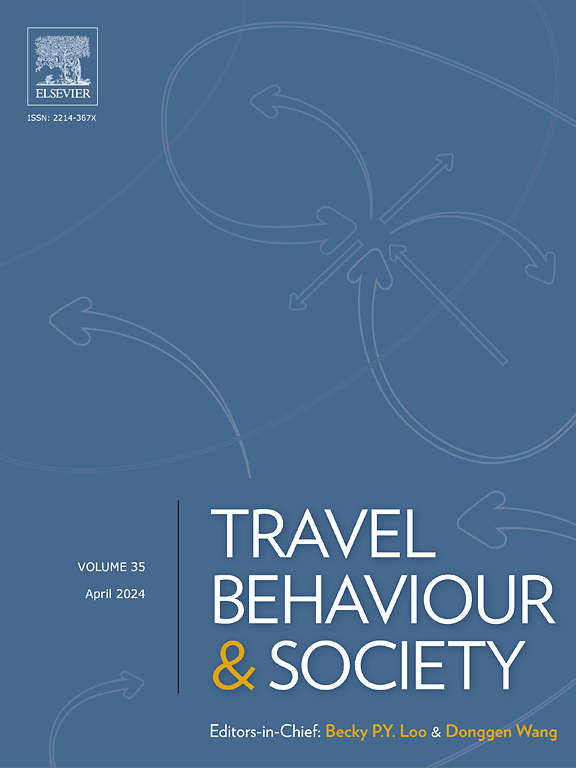当特定场景的因素发生变化时,是什么驱使人们选择机器人出租车?中国城市的实验调查
IF 5.7
2区 工程技术
Q1 TRANSPORTATION
引用次数: 0
摘要
本研究通过基于因子的小图实验,探讨了中国城市自动驾驶出租车采用的认知和语境决定因素。该研究将计划行为理论与前景理论相结合,考察了在自动驾驶出租车运营的城市中,个人层面的信念和场景特定因素如何影响用户和非用户的采用意愿。该设计通过操纵感知经济利益和驾驶任务厌恶(DTA)来测试不对称行为反应。研究结果表明,高经济效益和高DTA显著增加了采用态度和意向,而低水平的这些因素不会产生对称的负面影响,这与损失厌恶原则一致。态度的形成因经验而异:用户最受经济利益的影响,而非用户对感知到的系统智能的反应更强烈。城市交通生态系统整合(UMEI)成为了人们积极态度的驱动因素,尤其是在强调平台兼容性和支付整合的情况下。结果通过展示依赖于参考的、非线性的评估模式,特别是对经济和驱动相关属性的评估模式,挑战了线性采用模型。本研究通过将行为理论结合到基于场景的设计中,为采用研究做出了贡献,并强调了新兴移动系统中对经验敏感模型的需求。策略含义包括隐私保证、用户细分和本地化集成策略的重要性,以最大限度地吸收。研究结果支持改进采用模型,以更好地反映复杂城市生态系统中的不对称效应和有限理性用户行为。本文章由计算机程序翻译,如有差异,请以英文原文为准。
What drives people to choose robo-taxis when scenario-specific factors change? An experimental investigation in Chinese cities
This study investigates the cognitive and contextual determinants of robo-taxi adoption in Chinese cities through a factorial vignette-based experiment. Integrating the Theory of Planned Behavior with Prospect Theory, the research examines how individual-level beliefs and scenario-specific factors shape adoption intentions among both users and non-users in cities where robo-taxis operate. The design manipulates perceived economic benefits and driving task aversion (DTA) across realistic mobility scenarios to test for asymmetric behavioral responses.
Findings reveal that high economic benefits and high DTA significantly increase adoption attitudes and intentions, while low levels of these factors do not produce symmetrical negative effects, consistent with loss aversion principles. Attitude formation differs by experience: users are most influenced by economic benefits, while non-users respond more strongly to perceived system intelligence. Urban Mobility Ecosystem Integration (UMEI) emerged as a driver of favorable attitudes, particularly when platform compatibility and payment integration were emphasized. The results challenge linear adoption models by demonstrating reference-dependent, nonlinear patterns of evaluation, especially for economic and driving-related attributes.
This study contributes to adoption research by combining behavioral theories in a scenario-based design and highlights the need for experience-sensitive models in emerging mobility systems. Policy implications include the importance of privacy assurance, user segmentation, and localized integration strategies for maximizing uptake. Findings support the refinement of adoption models to better reflect asymmetric effects and boundedly rational user behavior in complex urban ecosystems.
求助全文
通过发布文献求助,成功后即可免费获取论文全文。
去求助
来源期刊

Travel Behaviour and Society
TRANSPORTATION-
CiteScore
9.80
自引率
7.70%
发文量
109
期刊介绍:
Travel Behaviour and Society is an interdisciplinary journal publishing high-quality original papers which report leading edge research in theories, methodologies and applications concerning transportation issues and challenges which involve the social and spatial dimensions. In particular, it provides a discussion forum for major research in travel behaviour, transportation infrastructure, transportation and environmental issues, mobility and social sustainability, transportation geographic information systems (TGIS), transportation and quality of life, transportation data collection and analysis, etc.
 求助内容:
求助内容: 应助结果提醒方式:
应助结果提醒方式:


